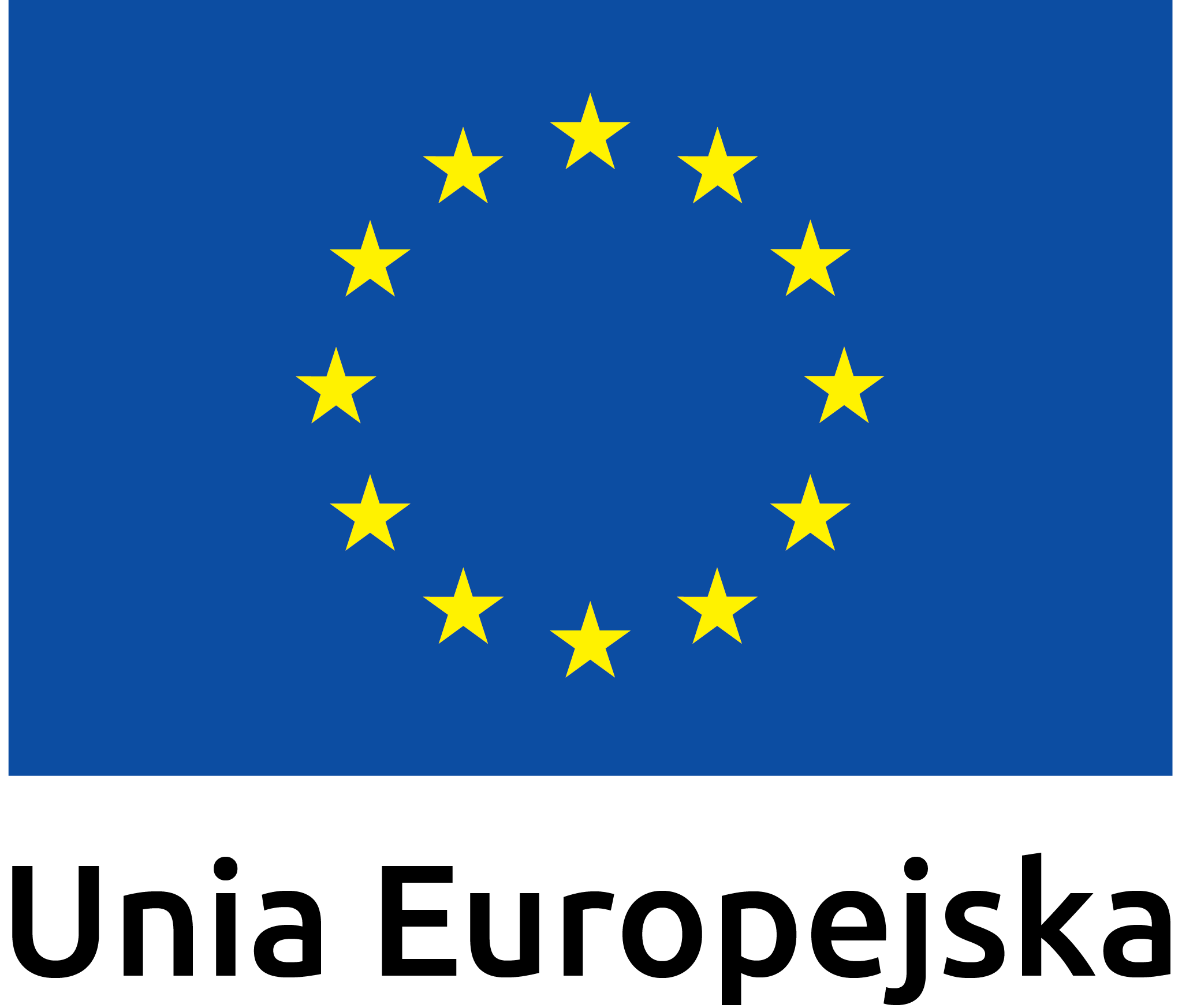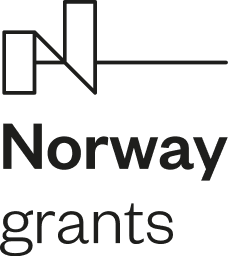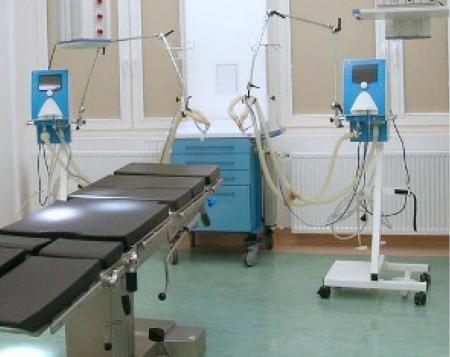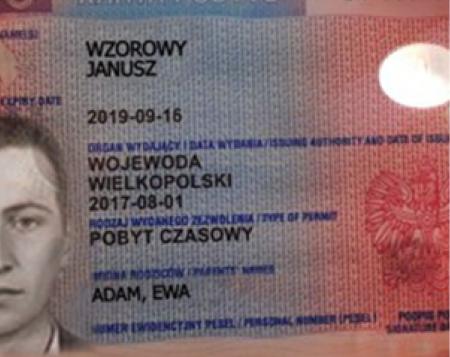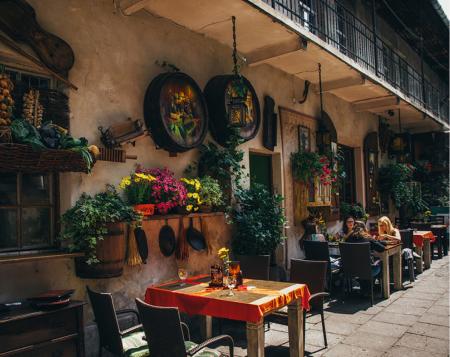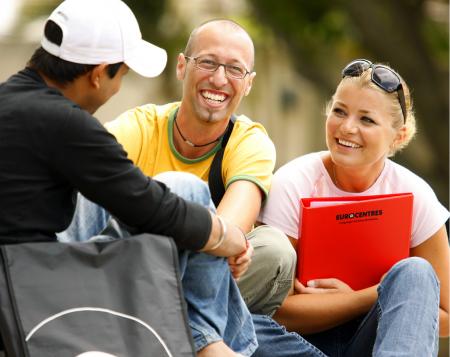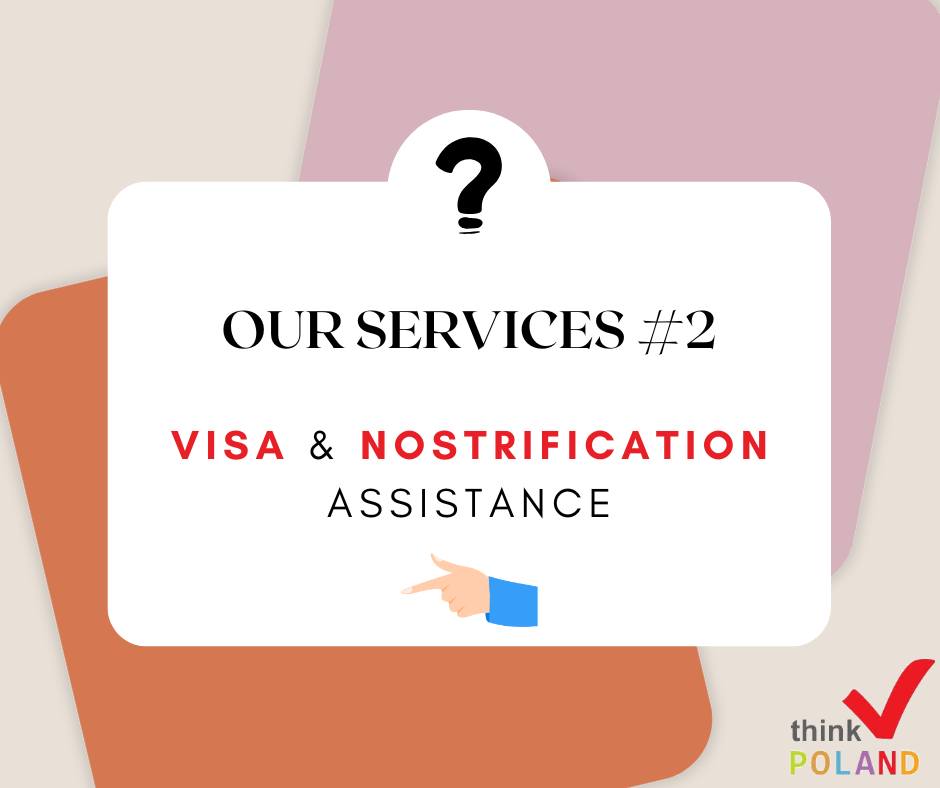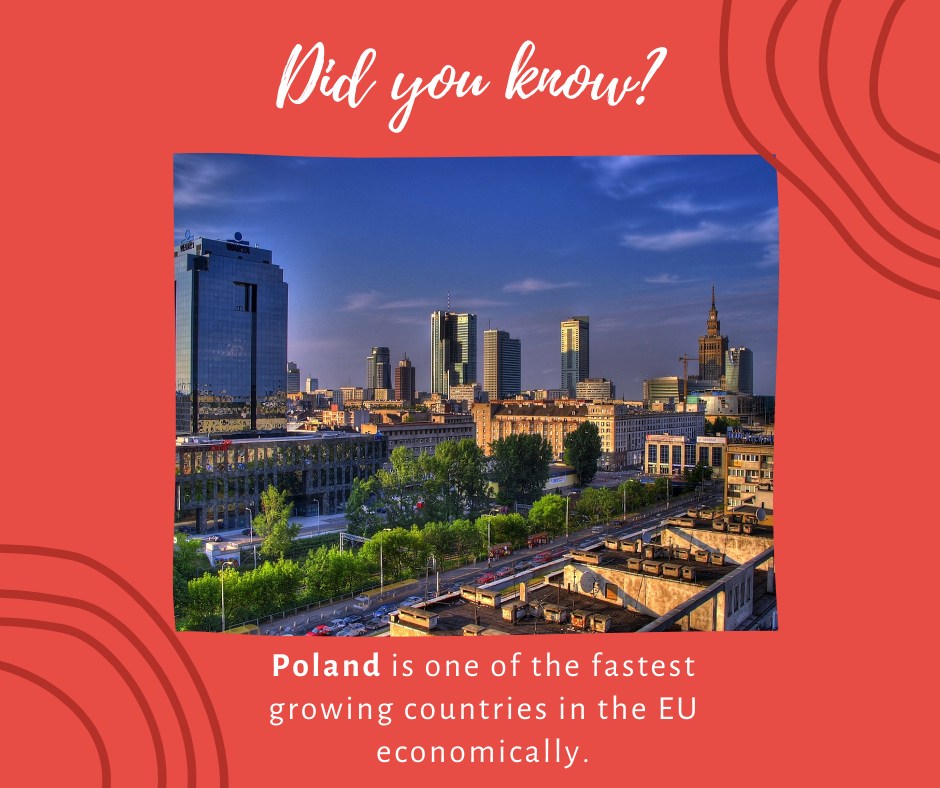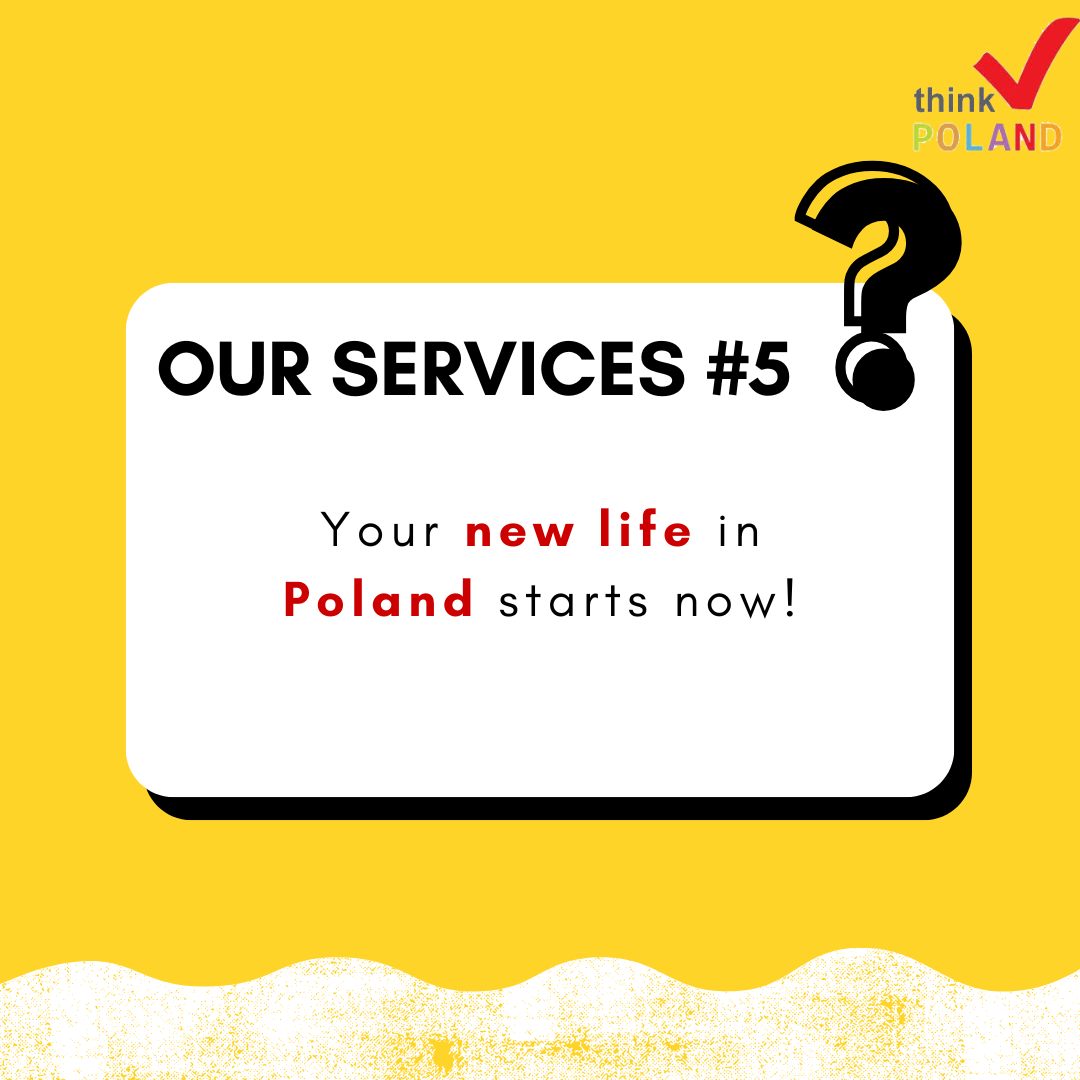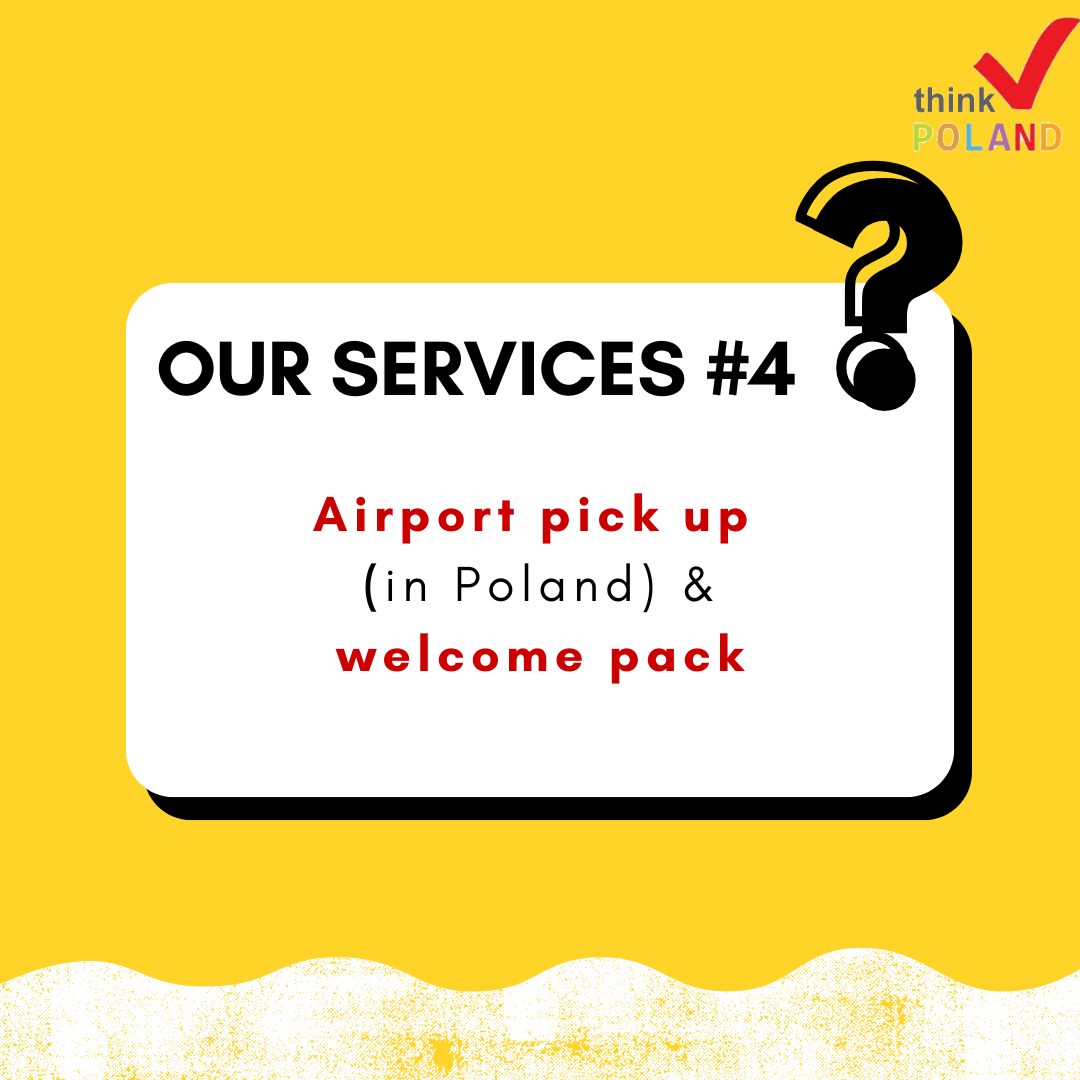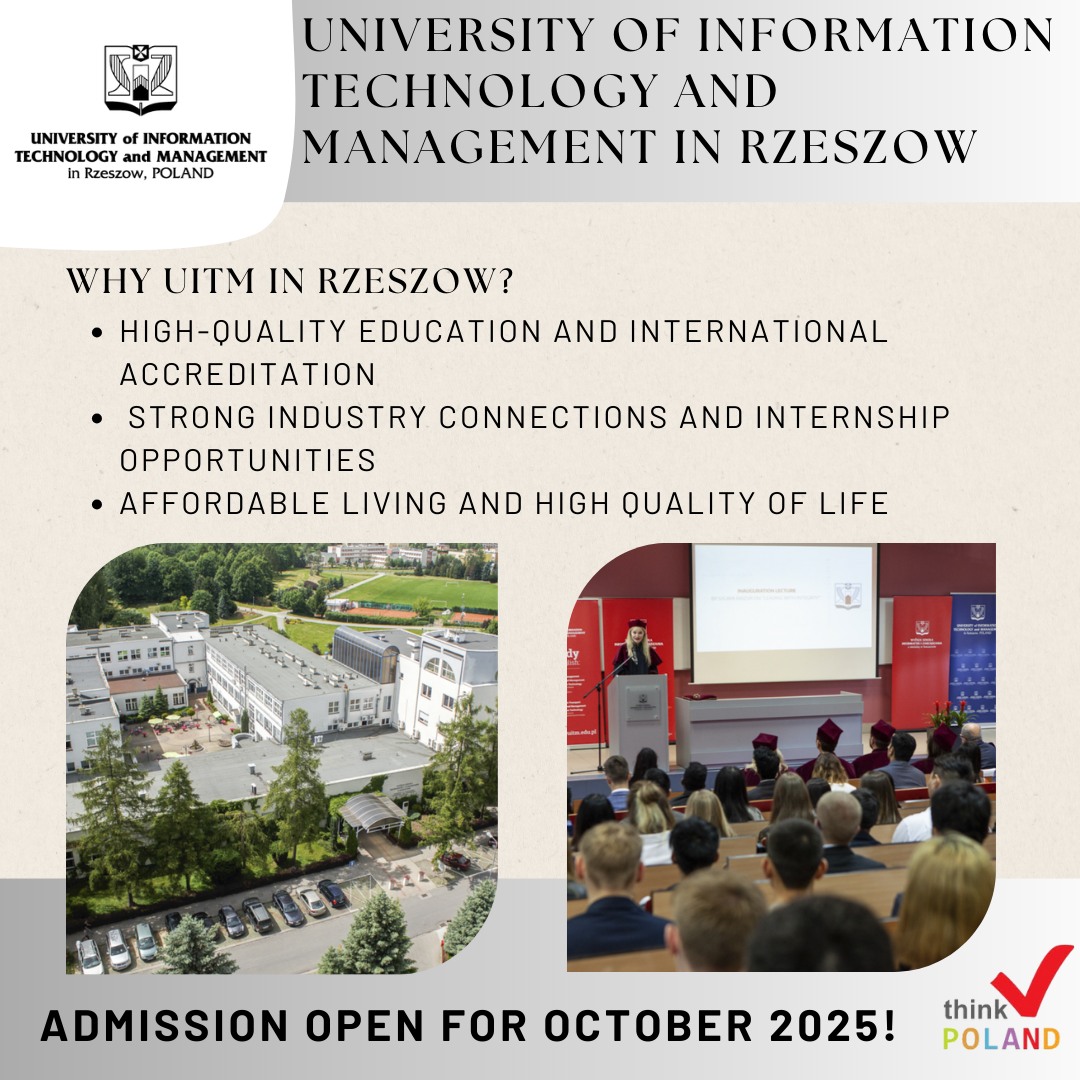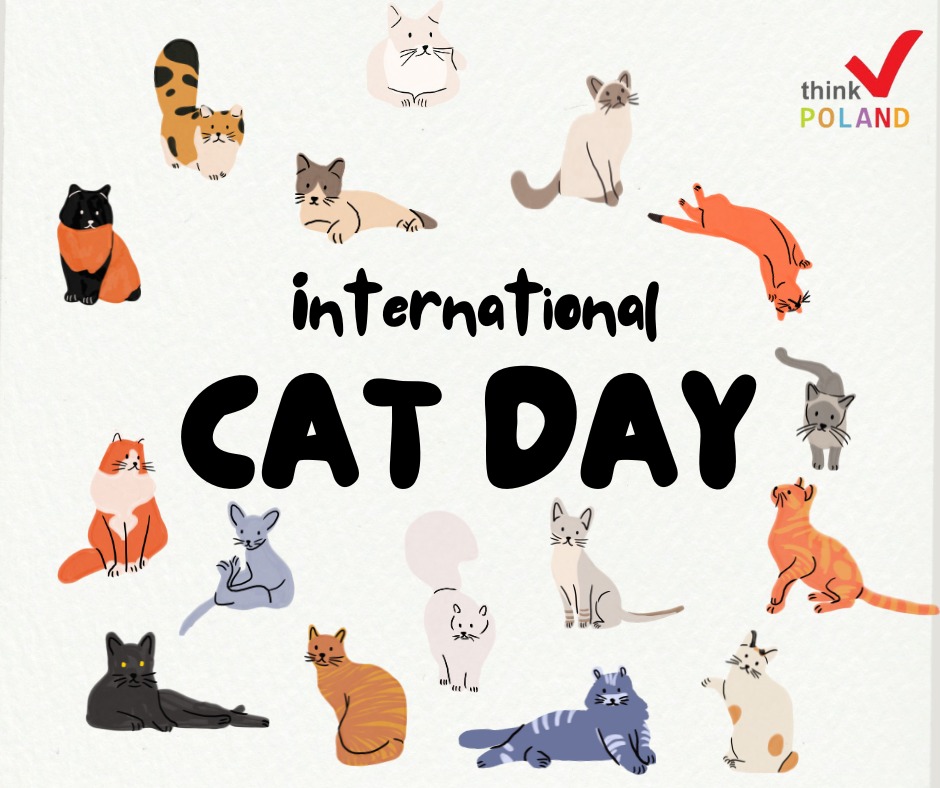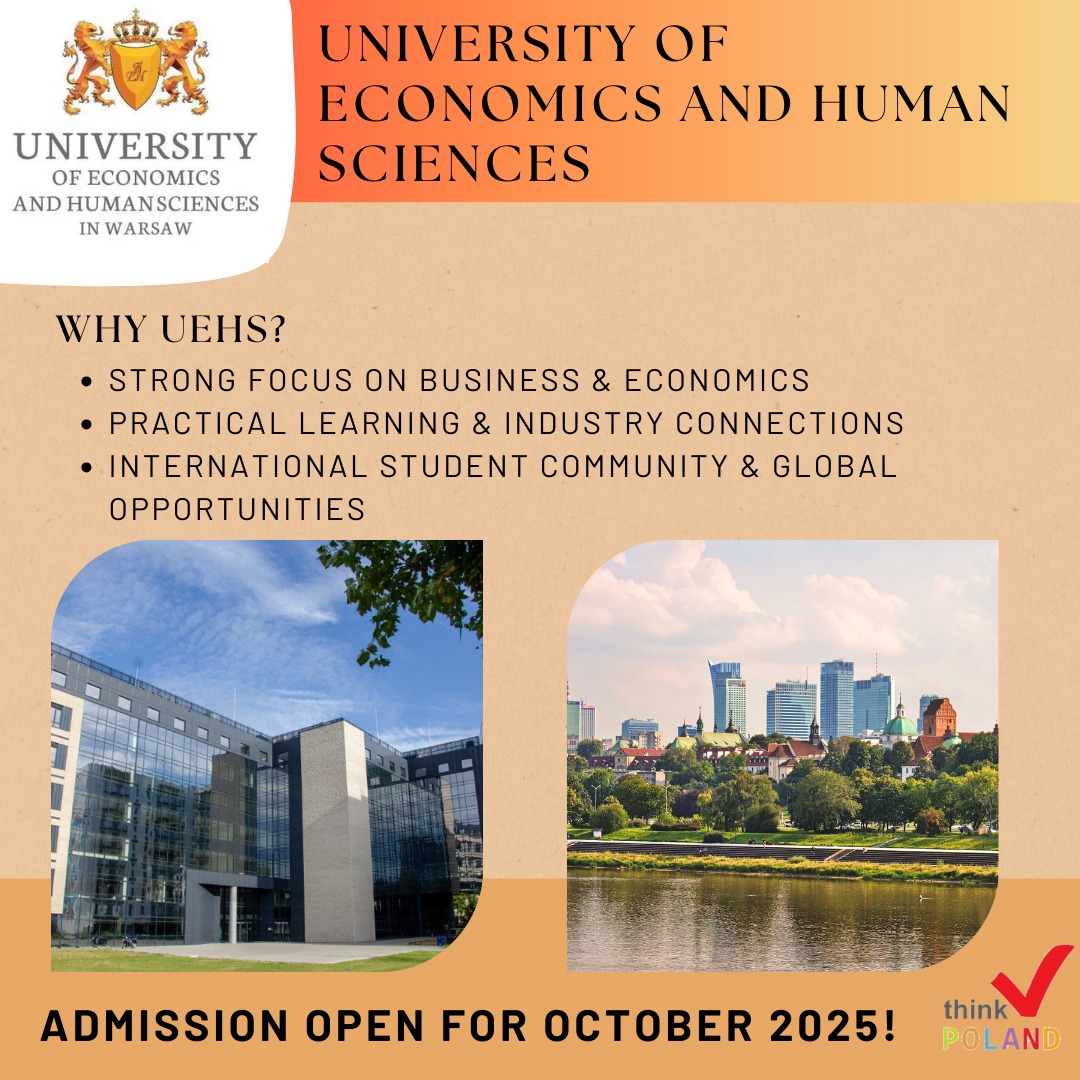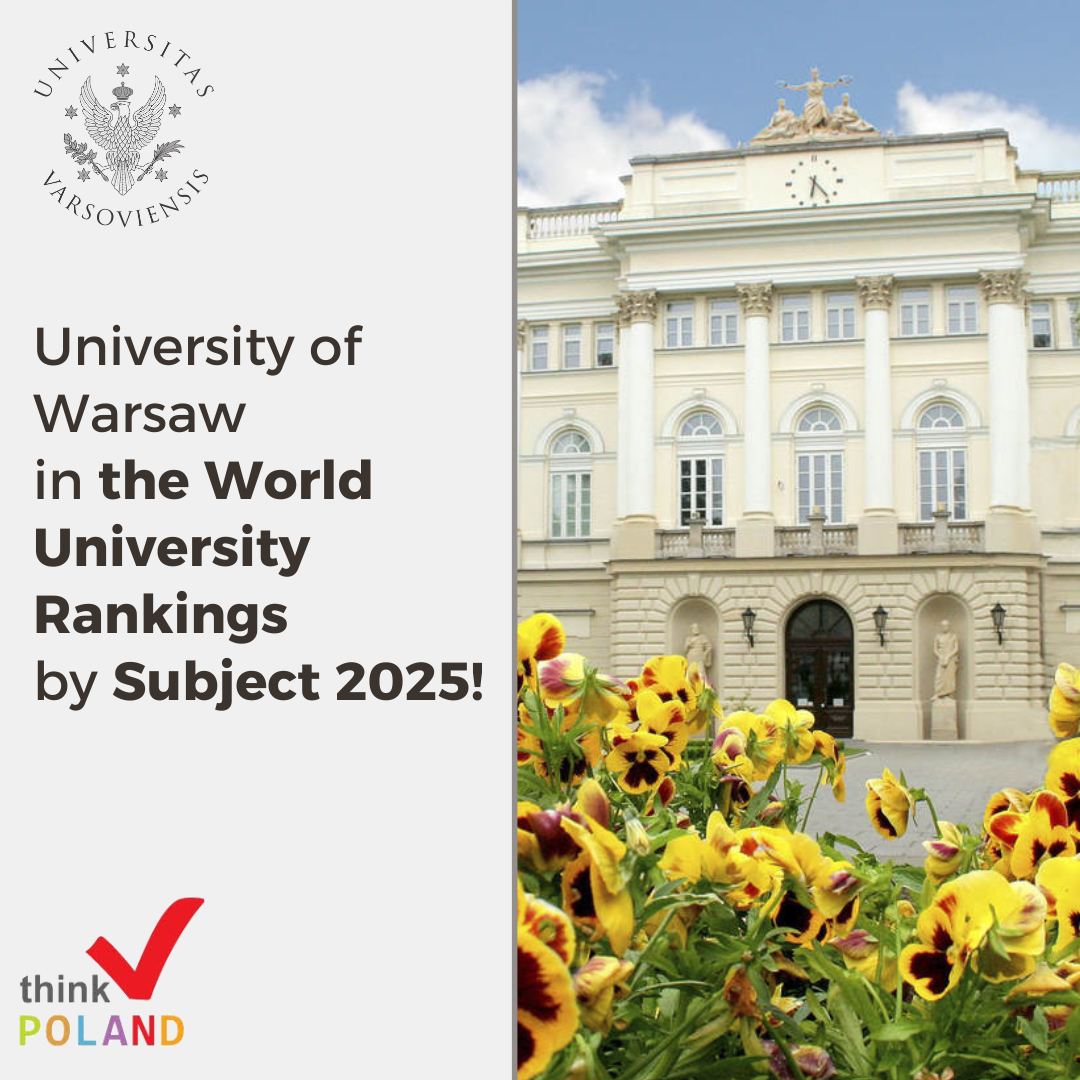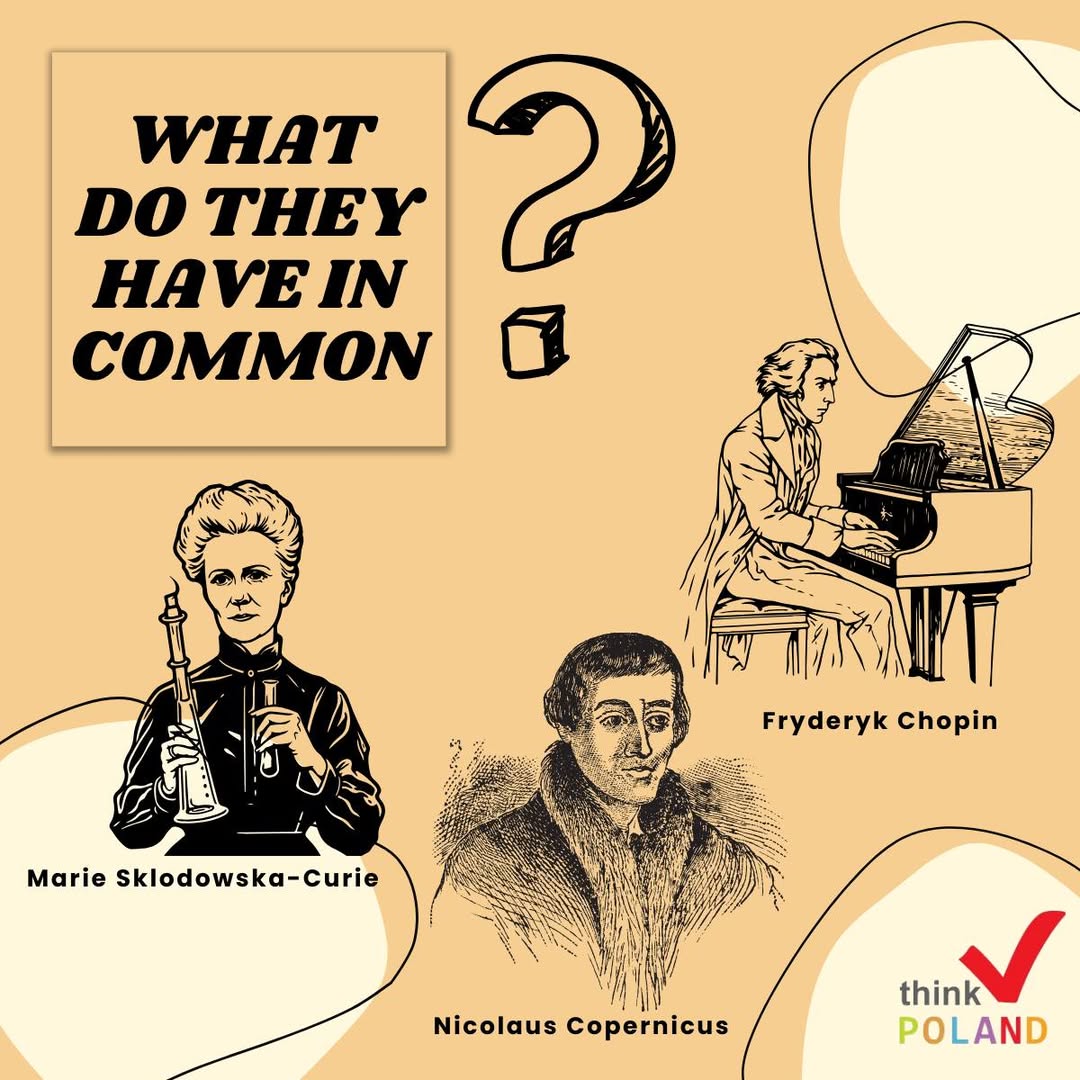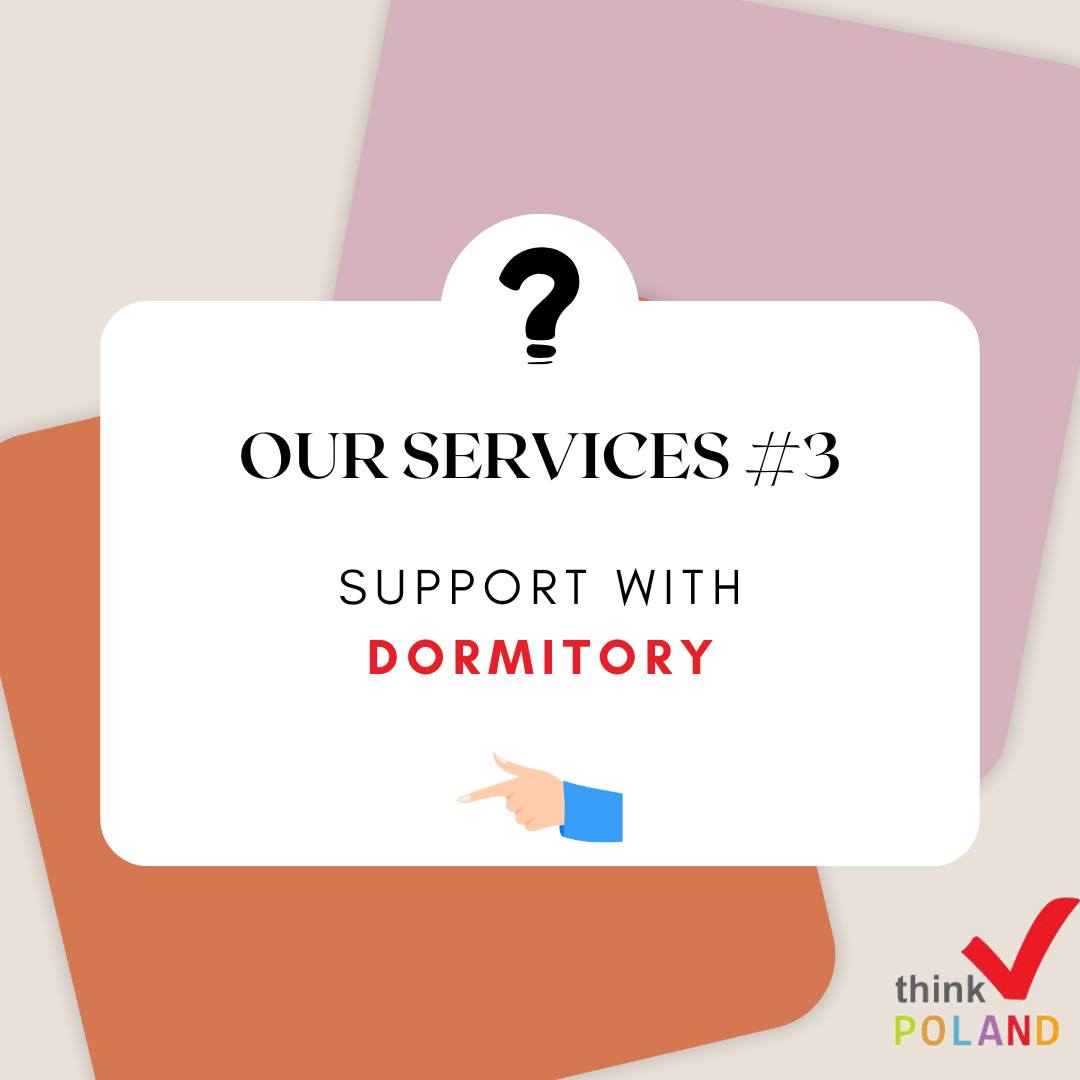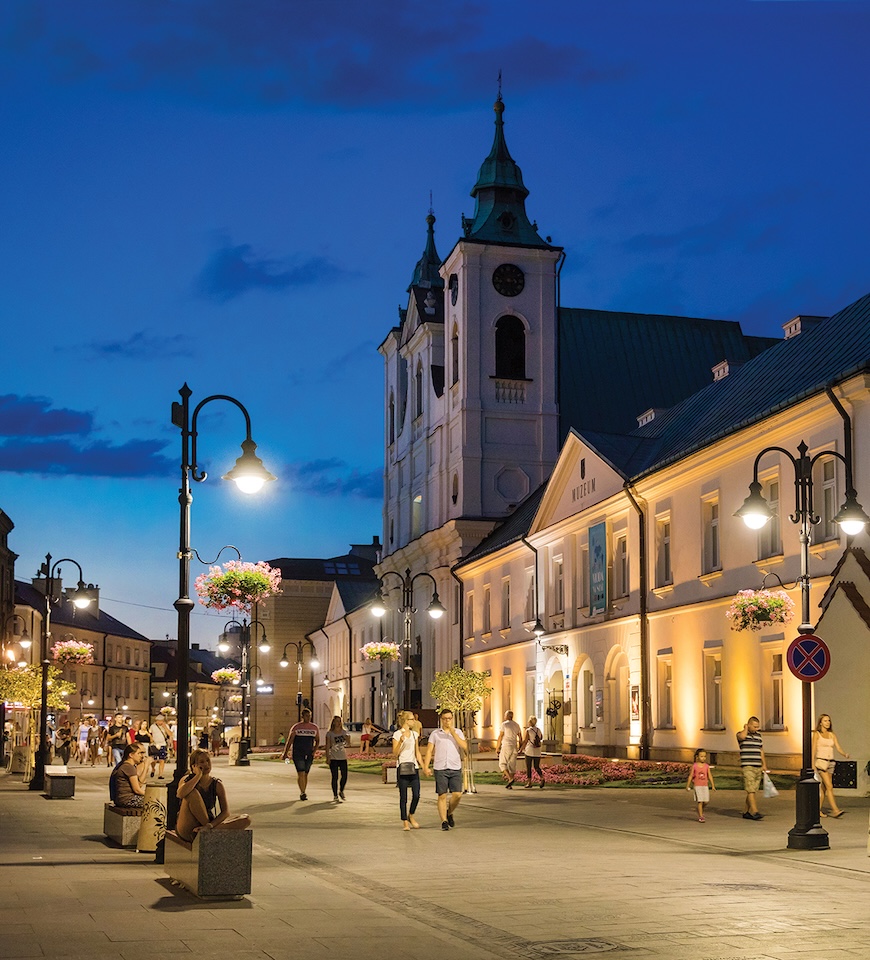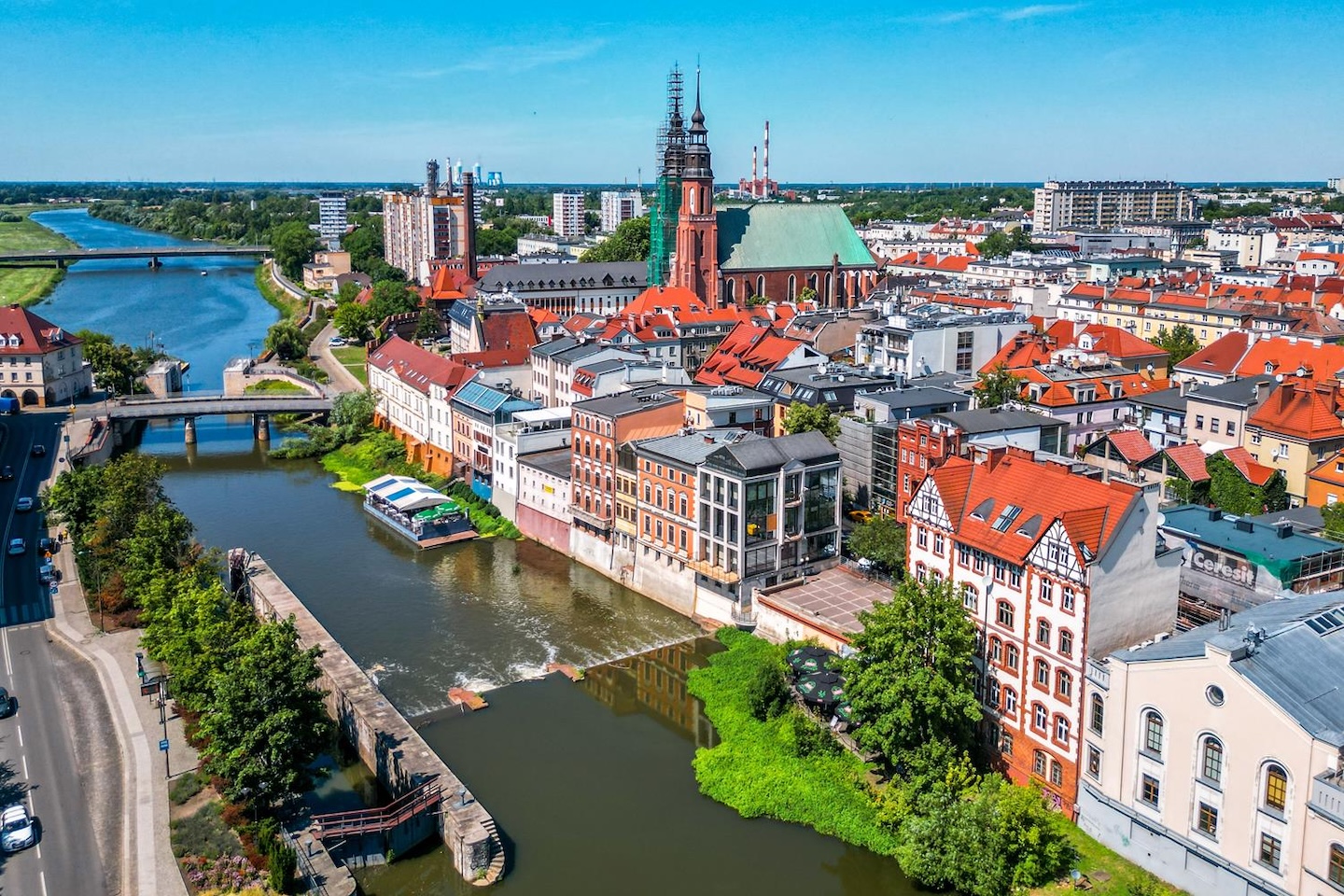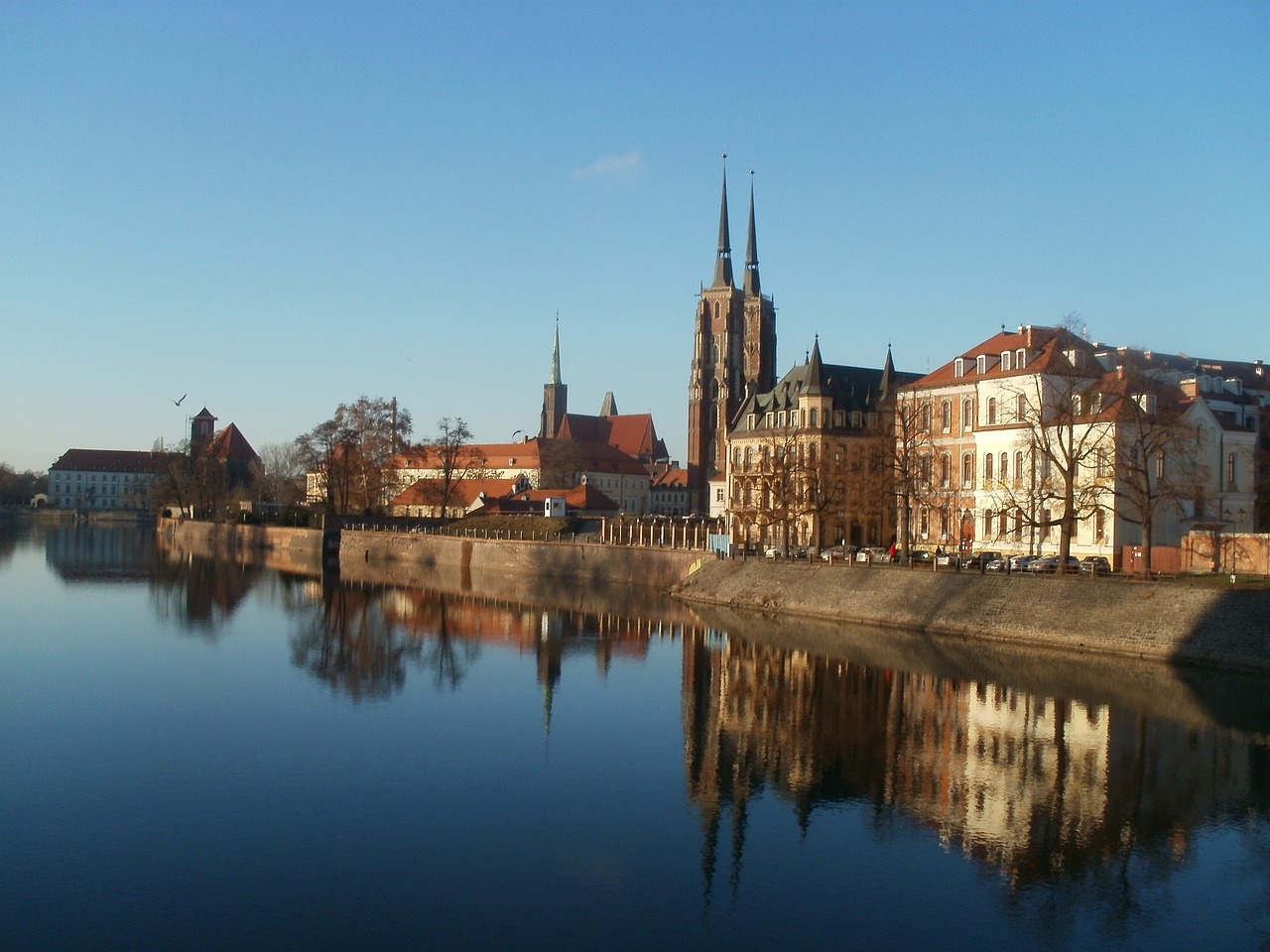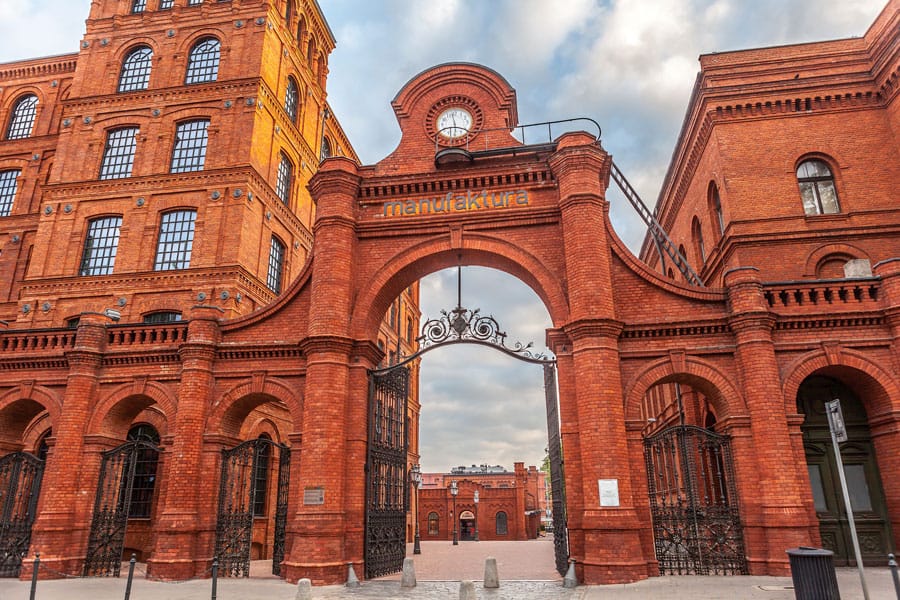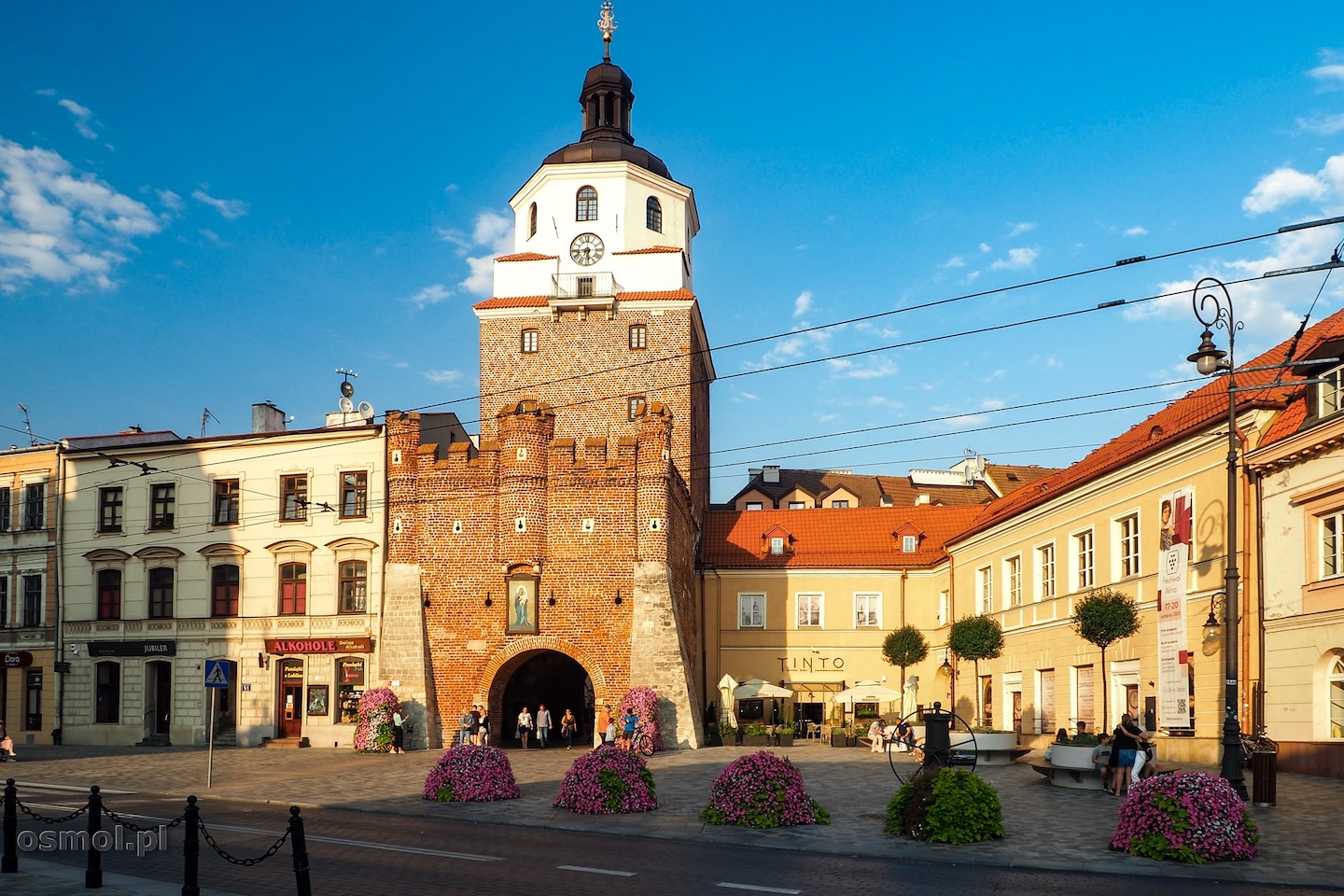Study and work in Poland / Europe
Newest programs
Top
Programs
With over 15 years of experience, Think Poland helps students from around the world find the best educational paths in Poland. Below is a list of programs most frequently chosen by our students.
We analyze each inquiry individually, adjusting options to your needs and budget. With us, you’ll discover your potential and start your study in Poland!
Top Programs
Your travel
This offer is made for you - wherever you are right now. It is available for you whether you are in your home country, travelling abroad or already in Poland. You can deal with all the formalities online, via mail, by visiting one of our offices or during individual consultations in your city. Please contact us and we will surely find an option for you.

I'm in my home country and ready to Study in Poland! Learn how to travel to Poland in 9 steps, including the visa process and key documents needed for a successful application.
-
1
Contact
Get in touch with us
These days, staying connected is super easy. You can reach us in tons of ways: drop by a Think Poland partner office, give us a call, hit us up on Skype, or shoot us an email. We’re here to answer all your questions, and you’ll hear back from us within 24 hours. Prefer a one-on-one chat? No problem! We can set up free individual consultations just for you. Don’t have a Think Poland office in your city? That’s totally fine! We regularly host meet-ups and one-on-one consultations in different cities. Just keep an eye on our website and follow us on Facebook for updates. Plus, Think Poland is the go-to organizer of events all about traveling to Poland. It’s an awesome chance to learn more about studying, working, moving, and exploring Poland.
Contact News EVENTS Facebook -
2
Offer
We will find the perfect deal for you
Thinking about studying abroad? Want to travel for a short time or stay a bit longer? We’ve got you covered! Our offer includes a variety of study programs that can be easily combined with part-time work options, depending on your preferences, budget, and travel goals. We’re the only company in the education market offering such an advanced program, along with a unique service browser to help you find exactly what you need.
Language courses Universities Acommodation Promotions -
3
Fast Quote
Get a quote in 1 minute
Log in to our website, go to the program browser, and find the right program for you. Generate one or more quotes in just a few clicks! You’ll see the number of quotes in the quote icon at the top right and in your shopping basket. You can calculate costs for one or more programs under a single student visa – even create a package. For example, combine two language courses or a language course with a degree program. You can also add services like accommodation or insurance. Recalculating and comparing costs is free, so you’ll get a clear idea of your expenses. Got questions? Call, email, or visit us – we’ll get back to you too!
Quote -
4
Univerity Application
Our services are competitive
With the Internet at your fingertips, you can plan your trip on your mobile or tablet. Many people heading to Poland already know what they want, compare offers, and check out info on social media. We’re all about adapting, so we offer multi-channel contact. You can handle your travel plans and formalities online or go the traditional route – it’s up to you! Our offer is rich and transparent, the only one of its kind on the market, giving you plenty of options to choose from. All our agreements will be confirmed in an official document, guaranteeing we meet all our promises. If needed, we’ll guide you through the process of document recognition (nostryfikacja), so your qualifications are accepted in Poland. Payments? You can take care of those online too, and we’ll help you find the best payment method for you.
-
5
Visa Support
We help you with your visa application
This is a key part of organizing your trip. Applying for a visa to Poland requires some preparation, and it can take a bit of time. With the help of our local partners, we’ll assist you in gathering all the necessary documents and filling out the visa application form. We’ll also get you ready for the visa interview to make sure everything goes smoothly. Since 2009, we’ve built up a ton of experience, and we have one of the highest success rates in visa approvals. And the best part? Visa application assistance is included in our service at no extra cost!
Student visa -
6
Flight
After you get your visa...
You’ll be able to download most of the documents you need before traveling directly from our system. We’ll send you a Pre-Departure Information Package via email, or you can grab it from our partner office. Our team knows Poland firsthand, and we’re happy to share our experience and answer any questions you may have. When you arrive, you’ll also receive a Think Poland Welcome Pack, complete with a Polish mobile number. Most importantly, you’ll get all the contact details you need to stay in touch with us from the moment you arrive and throughout your stay, no matter which city you’re in.
Post-arrival services -
7
Accommodation & Temporary Residence Card
Arrival and accommodation
You’ve got your plane ticket, and you’ve let us know your arrival date. If you’ve booked accommodation through us, don’t worry about getting there—we’ve got you covered! No matter what type of accommodation you chose, it’s part of our service to pick you up and make sure you arrive safely. Whether you’re coming by train or plane, our representative will be waiting for you at the airport or train station with a Think Poland sign, ready to take you to your new place.
We also take care of applying for your Temporary Residence Card (TRC) on your behalf, so you don’t have to worry about the paperwork. No matter which city you choose to stay in, someone from our team will guide you through an Orientation Tour to help you navigate the city, use public transport, and find the best places to shop. We provide legal advice, emergency phone support, and assist with all the necessary formalities once you arrive in Poland.
Post-arrival services Accommodation -
8
7/24 Support
Multilingual Warsaw office
We’re the first company to open a year-round, multilingual student office right in the heart of Warsaw. At our office, you can use computers, the internet, a copier, or a scanner. You can even use our office as your mailing address while you’re in Poland! Our team of over 15 people is dedicated to helping students in their own language, making sure you feel supported throughout your stay.
We’re here to answer all your questions and ensure you have a smooth transition to life in Poland.
Office in WarsawIntegration events -
9
Work
Job Assistance
While studying in Poland, you can also work legally. This not only helps you cover everyday expenses but also gives you a great chance to meet new people and explore the country more. Finding typical student jobs is usually not too difficult. Common jobs for students include language teacher, waiter/waitress, bartender, babysitter, salesperson, or cleaner. For most of these jobs, basic knowledge of Polish is often required.
If you don’t speak Polish yet, Think Poland will help you find and sign up for a basic Polish course, which will greatly improve your chances of finding a job. Keep in mind, we are not a job agency, and our assistance is purely informational, based on our knowledge of the local job market. Companies that specialize in offering jobs must be registered in the **National Register of Employment Agencies (KRAZ)** and must be specifically focused on this area. It’s also a good idea to check websites that specialize in job offers for foreigners who don’t speak Polish.
Work in Poland
I'm in Poland and need to extend my legal stay. Discover 5 steps to apply for a Temporary Residence Card (TRC) or enroll in a new program.
-
1
Don't hesitate to ask
Are you already in Poland and planning to stay longer?
Hello! If you’re currently in Poland and considering staying longer, we have some important information for you. Whether you organized your trip independently, with us, or with friends, pursuing your goals is what truly matters.
Staying in Poland is a complicated, multi-step process that requires the support of an experienced team. Regardless of the type of visa you hold or where you are in Poland, you can always reach out to our office in Warsaw. We are here to help! We offer advice, support, and the best solutions for your situation.
Our process includes the Temporary Residence Card (TRC) and a clear path for submitting the necessary documents. Don’t hesitate to contact us and learn how you can continue your journey in Poland!
Office in WarsawIntegration event -
2
Quote
Log In to Check Prices for Your Country
We understand what it's like to be a student abroad. You’re busy studying, working, making friends, and trying to explore everything Poland has to offer. With limited time left, you still need to find time to apply for a Temporary Residence Permit if you want to extend your stay as a student.
To help you make the most of your experience, you can use our program database and browser, where you'll find a variety of options. Look for the program that suits you best and add it to your quote. You can also combine courses and programs into packages, such as a language course plus a university degree program, or include additional services like accommodation and insurance.
We’ll check the availability of your chosen course or program, and if it’s unavailable, we’ll suggest similar alternatives. If you have any questions, just let us know! We have extensive knowledge of all the schools and universities, and thanks to recommendations from our students, we’re excited to share that expertise with you.
LOG INCREATE ACCOUNTLOG IN VIA FB -
3
Payment in installments
We will handle all the formalities for you, free of charge.
While you decide on the best course or program for your needs, our free consultations and quote generation come with no obligation to pay. The type of documents required for the application process and the payment plan can vary depending on the school you choose.
We’re here to help you select a school that matches your preferences and financial capabilities. We’ll inform you whether the payment is due per semester or annually, and explain the factors that influence this. In some cases, payments may also be possible in installments, and we will guide you on how to set this up. Additionally, you’ll be able to make tuition fee payments directly to the university's account. -
4
Student Visa & TRC Process
We Assist You in the TRC Process
This is a crucial stage in organizing your travel. The Temporary Residence Card (TRC) process in Poland requires careful preparation, and it can take some time. We will help you gather all the necessary supporting documents and fill out the TRC application form.
Our multilingual team of 15 professionals has been supporting students since 2009, bringing over 15 years of experience to ensure you receive the best assistance possible. We’ll also prepare you for the TRC interview to ensure everything goes smoothly. With a proven track record of high positive decision rates, you can trust us to guide you through each step.
Students visa Residence card -
5
Job Alerts
What's Next?
Congratulations on becoming a Think Poland student! We are your go-to information point whenever you need assistance, including job support. You're also welcome to join our regular integration events, which include a variety of activities designed to help you connect with other students and immerse yourself in Polish culture.
We organize exciting football matches, social gatherings, cultural outings, and many more events to make your experience in Poland enjoyable and memorable. These activities are a great way to meet new friends, practice your Polish, and discover the vibrant community around you. Additionally, our job support services can help you navigate the local job market, offering guidance on finding opportunities that suit your skills and interests. Stay engaged and make the most of your time here!"
Contact
Why
Poland?
Poland boasts over 1,000 years of culture and traditions that are nurtured by subsequent generations.
The fastest growing economy, the most delicious apples and strawberries, the tallest office building in the European Union.
The country of Nicolaus Copernicus, Maria Skłodowska-Curie, Fryderyk Chopin, John Paul II and Lech Wałęsa.
Safe country with strong economy
EU and NATO member placed in heart of Europe
38 mln
people
1,22 mln
of students
341
universities
Sea and mountains, 4 seasons and fantastic people
Verified Reviews
these quys are quick fast and efficient .... i reccomend hundred percent.
Selamlar! Normalde danışmanlık yapan şirketler belli işleri yaptıktan sonra öğrencilerle fazla ilgilenmezler fakat Think Poland bu yargımı tam anlamıyla kırdı. Gerek havaalanı karşılamasından gerek kalacağımız yerlere eşlik edilmesinden,banka hesabı açma,oryantasyon,kayıt işlemleri,sağlık sigortası,oturum izni...Her türlü konuda inanılmaz yardımcı oluyorlar.Mail ve mesaj yoluyla hemen kendilerine ulaşabiliyor ve her konuda bilgi alabiliyorsunuz asla yarı yolda kalmıyorsunuz. Danışman olarak benimle alakadar olan Enes Bey gerçekten çok profesyonel ve işinizle alakalı her detayı sizinle anında paylaşıyor ve çok kibar
Polonya`ya geldiğimizde kalacağımız geçici yeri bulmaya ve hatta havaalanından oraya ulaşmaya, kalıcı yerimizi bulmaya, banka hesabı açmaya, telefon hattı almaya, aklınıza gelebilcek küçük ya da büyük ama çok temel olan her şeye çok yardımcı oldular. Daha sonrasında oturma kartı işlemlerimizde yardımcı oldular, okulla ilgili problemlerimize çözüm bulmaya çalıştılar. Özellikle şu günlerde aşı ile ilgili sorularımıza her zaman cevap veriyorlar. Think poland ekibinin yardımları yalnızca geldiğiniz ilk günlerde değil ihtiyaç duyduğunuz her anda oluyor.
Really good and professional organisation with nice people working in it. There are lot to uncover when it comes to end to end process of a student coming abroad and they do it with ease and effortless for us. They take ownership for the students and answer and help them to understand why and where the things are done rather than pushing us to do meaningless things like other student agencies. They provide extra care and support for those who needs it. Highly recommended and special mention to Marcin and Aylene for being absolutely amazing in the organisation :)
Think Poland took care of the procedure every day, even before I came to Warsaw. When I came to Warsaw, I had no worries because I knew that with Think Poland I would take care of everything. I would like to thank the whole Think Poland team, especially Murat Birlik and brother Melih. I don't know what I would have done without Think Poland. They are still more closely involved my procedure. Thanks to Think Poland, we made my university application and was accepted. Thank you again. I highly recommend Think Poland to everyone.
Thank you, Think Poland(TP) for your excellent service. I was given a brief walk-through of the entire process and TP professionals guided me with all the things I needed to do, and everything went extremely well. I did not even feel pressured and stressed out during the entire process. I was relieved from all the stress of processing and it was a smooth transition. I appreciate all your efforts and I’d highly recommend your service to others. Thanks, highly recommended.
An excellent educational consultancy service. They provided friendly and helpful service from the moment of my arrival in Poland until the last moment. Thanks to their professional help during my university application process, I started my education. After my university application, they always helped with issues such as accommodation and living in a new city etc. Thank you so much Think Poland!
An excellent educational consultancy service. They provided friendly and helpful service from the moment of my arrival in Poland until the last moment. Thanks to their professional help during my university application process, I started my education. After my university application, they always helped with issues such as accommodation and living in a new city etc. Thank you so much Think Poland!
Since I arrived in Warsaw, as a foreigner, I have been experiencing different problems every day. That is, until I met ThinkPoland. Thanks to the support and advice I received from them, I carried out all my work in a reliable, official and fast manner. The whole team is very friendly. I am especially grateful for Mr. Murat's attention. Thank you all for everything!
Very professional firm, I went there to get help with my Temporary residence card and my overall process was very smooth as I had zero difficulties. They explain every process in details. Highly recommended if you want to get Temporary residence card. Just go there and the rest they will handle for you.
Before I arrived, my head was filled with dozens of questions. How do I find a place to stay, how to handle school work, how can I get used to Poland etc. But since the minute my plane landed in Poland, they have helped me so much so I could easily adapt. I would like to thank the Think Poland team.
Daha önce bir çok danışmanlık şirketiyle çalışmış biri olarak söylüyorum çok kaliteli bir hizmet veriyorlar. Danışmanım Murat bey bütün süreçte bana yardımcı oldu ve titizlikle ilgilendi. Burdan tekrar teşekkür ederim. Kaliteli hizmet ve kaliteli iletişim.
I would like to thank them very much for always supporting me from the moment I stepped into Poland and I recommend their services to everyone. Also, I would like to thank Enes Bey and Aylin Hanım for their help about residence card process and enrollment to school.
I used their services for a semester and I am really satisfied. I did not even touch for registration and apply. I just signed and sent them. Especially I am greatful for Murat’s help, thank you guys for everything. Highly Recommend 👍🏼👍🏼👍🏼
Polonya`ya geldiğimden beri her konuda titizlikle yardım ederek buraya alışma sürecimi çok kolaylaştırdılar. Aynı zamanda şuan üniversite tercihlerim konusunda Murat Bey güzel tavsiyelerde bulunarak bana yardımcı olmuştur.
The staff here are enthusiastic, responsible, friendly and considerate. They can help you solve any problems you encounter. Being with them is like being with family. The atmosphere is very good. You will not regret choosing them.
I used their services for a semester and I am really satisfied. I did not even touch for registration and apply. I just signed and sent them. Especially I am greatful for Murat’s help, thank you guys for everything.
Çok başarılı ve gerçekten her konu da çok yardımcı oluyorlar herkese tavsiye ederim. Really friendly and nice place everyone was very helpful.💯
Many thanks to Think Poland specialty to Dr. Marcin Wysokiński for assisting my son to continue his studies in POLAND
these quys are quick fast and efficient .... i reccomend hundred percent.
Selamlar! Normalde danışmanlık yapan şirketler belli işleri yaptıktan sonra öğrencilerle fazla ilgilenmezler fakat Think Poland bu yargımı tam anlamıyla kırdı. Gerek havaalanı karşılamasından gerek kalacağımız yerlere eşlik edilmesinden,banka hesabı açma,oryantasyon,kayıt işlemleri,sağlık sigortası,oturum izni...Her türlü konuda inanılmaz yardımcı oluyorlar.Mail ve mesaj yoluyla hemen kendilerine ulaşabiliyor ve her konuda bilgi alabiliyorsunuz asla yarı yolda kalmıyorsunuz. Danışman olarak benimle alakadar olan Enes Bey gerçekten çok profesyonel ve işinizle alakalı her detayı sizinle anında paylaşıyor ve çok kibar
Polonya`ya geldiğimizde kalacağımız geçici yeri bulmaya ve hatta havaalanından oraya ulaşmaya, kalıcı yerimizi bulmaya, banka hesabı açmaya, telefon hattı almaya, aklınıza gelebilcek küçük ya da büyük ama çok temel olan her şeye çok yardımcı oldular. Daha sonrasında oturma kartı işlemlerimizde yardımcı oldular, okulla ilgili problemlerimize çözüm bulmaya çalıştılar. Özellikle şu günlerde aşı ile ilgili sorularımıza her zaman cevap veriyorlar. Think poland ekibinin yardımları yalnızca geldiğiniz ilk günlerde değil ihtiyaç duyduğunuz her anda oluyor.
Really good and professional organisation with nice people working in it. There are lot to uncover when it comes to end to end process of a student coming abroad and they do it with ease and effortless for us. They take ownership for the students and answer and help them to understand why and where the things are done rather than pushing us to do meaningless things like other student agencies. They provide extra care and support for those who needs it. Highly recommended and special mention to Marcin and Aylene for being absolutely amazing in the organisation :)
Think Poland took care of the procedure every day, even before I came to Warsaw. When I came to Warsaw, I had no worries because I knew that with Think Poland I would take care of everything. I would like to thank the whole Think Poland team, especially Murat Birlik and brother Melih. I don't know what I would have done without Think Poland. They are still more closely involved my procedure. Thanks to Think Poland, we made my university application and was accepted. Thank you again. I highly recommend Think Poland to everyone.
Thank you, Think Poland(TP) for your excellent service. I was given a brief walk-through of the entire process and TP professionals guided me with all the things I needed to do, and everything went extremely well. I did not even feel pressured and stressed out during the entire process. I was relieved from all the stress of processing and it was a smooth transition. I appreciate all your efforts and I’d highly recommend your service to others. Thanks, highly recommended.
An excellent educational consultancy service. They provided friendly and helpful service from the moment of my arrival in Poland until the last moment. Thanks to their professional help during my university application process, I started my education. After my university application, they always helped with issues such as accommodation and living in a new city etc. Thank you so much Think Poland!
An excellent educational consultancy service. They provided friendly and helpful service from the moment of my arrival in Poland until the last moment. Thanks to their professional help during my university application process, I started my education. After my university application, they always helped with issues such as accommodation and living in a new city etc. Thank you so much Think Poland!
Since I arrived in Warsaw, as a foreigner, I have been experiencing different problems every day. That is, until I met ThinkPoland. Thanks to the support and advice I received from them, I carried out all my work in a reliable, official and fast manner. The whole team is very friendly. I am especially grateful for Mr. Murat's attention. Thank you all for everything!
Very professional firm, I went there to get help with my Temporary residence card and my overall process was very smooth as I had zero difficulties. They explain every process in details. Highly recommended if you want to get Temporary residence card. Just go there and the rest they will handle for you.
Before I arrived, my head was filled with dozens of questions. How do I find a place to stay, how to handle school work, how can I get used to Poland etc. But since the minute my plane landed in Poland, they have helped me so much so I could easily adapt. I would like to thank the Think Poland team.
Daha önce bir çok danışmanlık şirketiyle çalışmış biri olarak söylüyorum çok kaliteli bir hizmet veriyorlar. Danışmanım Murat bey bütün süreçte bana yardımcı oldu ve titizlikle ilgilendi. Burdan tekrar teşekkür ederim. Kaliteli hizmet ve kaliteli iletişim.
I would like to thank them very much for always supporting me from the moment I stepped into Poland and I recommend their services to everyone. Also, I would like to thank Enes Bey and Aylin Hanım for their help about residence card process and enrollment to school.
I used their services for a semester and I am really satisfied. I did not even touch for registration and apply. I just signed and sent them. Especially I am greatful for Murat’s help, thank you guys for everything. Highly Recommend 👍🏼👍🏼👍🏼
Polonya`ya geldiğimden beri her konuda titizlikle yardım ederek buraya alışma sürecimi çok kolaylaştırdılar. Aynı zamanda şuan üniversite tercihlerim konusunda Murat Bey güzel tavsiyelerde bulunarak bana yardımcı olmuştur.
The staff here are enthusiastic, responsible, friendly and considerate. They can help you solve any problems you encounter. Being with them is like being with family. The atmosphere is very good. You will not regret choosing them.
I used their services for a semester and I am really satisfied. I did not even touch for registration and apply. I just signed and sent them. Especially I am greatful for Murat’s help, thank you guys for everything.
Çok başarılı ve gerçekten her konu da çok yardımcı oluyorlar herkese tavsiye ederim. Really friendly and nice place everyone was very helpful.💯
Many thanks to Think Poland specialty to Dr. Marcin Wysokiński for assisting my son to continue his studies in POLAND
these quys are quick fast and efficient .... i reccomend hundred percent.
Inspiring and safe

